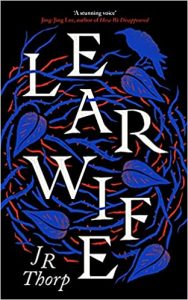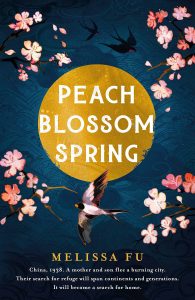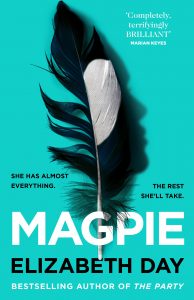A classic reimagined, a sweeping family history and a thought-provoking thriller are this month’s must-reads
Words by Charlotte Griffiths
 Learwife by J. R. Thorp
Learwife by J. R. Thorp
This fascinating concept shines the spotlight on a character traditionally in the background: the wife of King Lear, Shakespeare’s tragic anti-hero and mother of his three infamous daughters. She only appears in two vague references (one to her being dead) in the original play, yet is given her own voice in this genre-defying debut from J.R. Thorp. We meet the 55-year-old queen in the convent she was banished to 15 years prior – just after the birth of her youngest, Cordelia – and told to ‘pray for the soul of the king’. Accompanied by her maid Ruth, she learns, like someone waiting outside the theatre doors of the tragic play, about the multiple deaths which have unfolded. Her husband and daughters are dead, her family disgraced – and she reels under the waves of grief, thrust into the knowledge of this harsh new world, while still physically locked within the convent’s walls. She reminisces about old conversations with her husband, her life in court, and – assuming she’s now free to go – makes plans to leave to find her family’s graves, and perhaps seek out her old friend, Kent. “I have been so quiet,” she says. “I have done my penance fivefold. Nobody could tell me for what, and I took the punishment in any case, because the king my love required it.” Her requests to leave are blocked by the abbess, who asks the nameless queen to stay, pointing out the hazardous and futile nature of the journey. The royal mother unwillingly agrees, stalking the walls, turning events over and over in her mind, in beautifully transporting prose that almost read like modernist poetry in places. The shards of meaning in her sentences only become clear when you let the words wash across you, slipping effortlessly between narrative and memory, sense and nonsense. The subjectivity of madness and how to recognise it in others is one of the brightest themes woven into this beautiful book.
The queen makes further attempts to leave, but sickness comes to the convent and the nuns are locked in quarantine together until Lent, faced with the all-too-real possibility of death at any moment. The abbess sickens and dies, lying in a “cave of her madness” for days, before leaving the convent rudderless. The remaining women jostle for power, while Thorp’s queen – outside the system, yet still within the walls – reigns supreme, sharing stories from her past, slipping into the present and back again. “And women last,” the queen observes. “Men rise and fall in sheaves, every season shaving down a new crop – war, honour. Women are weaker but we last: we sink into age, grow long bones, tell stories, hoard four score and ten. We get old and hairy and forget naught.” This immersive, wonderfully constructed book spans grief, love, duty and power, and is a must for anyone who enjoys feminist-focused reimaginings.
 Peach Blossom Spring by Melissa Fu
Peach Blossom Spring by Melissa Fu
This huge, sweeping debut novel by Cambridge-based author Melissa Fu started life as nothing more than a short piece of writing about her father’s fruit trees, and ended up a multigenerational tale spanning 70 years, unpicking China’s tumultuous 20th century.
The story opens quietly in Changsha, in 1938, in the home of Dao Hongtse and his three wives (whose ‘names are not important’) plus his sons, Dao Longwei and Dao Xiaowen, who are both far from home ‘protecting the future of the Republic’.
The story opens quietly in Changsha
Shui Meilin, the wife of Dao Xiaowen, is diligently at work in her husband’s family antiques business. Her three-year-old son Renshu and his young cousin Liling charge around her feet, screaming with laughter, before Dao Longwei’s fearsome wife Wenling crossly retrieves her daughter from the room, and the youngest generation are begrudgingly put to bed. The gentle domesticity of the scene is offset by the knowledge that the Japanese are advancing and, later in 1938, the Changsha fire would see 30,000 people lose their lives. It’s that tragedy which forces Meilin to flee with Renshu and begin her huge journey to safety, wherever that might be. The family takes comfort from a small, illustrated hand scroll containing ancient fables and stories, given by Xiaowen to Meilin. Huddled on boat decks or in the back of wagons, they read it for guidance – Meilin deliberately altering the ending of the harder stories to give her young son hope – while waiting to see what fate might deal them next. The book follows their escape to Taiwan and the terrifying choices they have to make en route – then Renshu’s eventual journey through education to America, and a new life (and new name) studying engineering even further from home. But even in this new, safer land, unforeseen challenges arise. Although fiction, this makes a fascinating overview of China’s recent history and – on a smaller scale – is a beautiful tale of love, loss and just how far a parent will go for their child. Perfect winter reading on darker evenings.
 Magpie by Elizabeth Day
Magpie by Elizabeth Day
There’s currently a real (and very welcome) trend for reassessing past perspectives from our new, slightly more aware and understanding, 2021 viewpoint. In podcast-land, Alissa Bennett and Lena Dunham’s The C-Word (it’s ‘Crazy’, in case you’re wondering) revisits women from the past who were maligned in their day. You’re Wrong About, by journalists Michael Hobbes and Sarah Marshall, involves similar discussions for all sorts of subjects. At first glance, Magpie, the latest novel from writer Elizabeth Day (creator of her own hit podcast How To Fail), is a classic, pacy domestic thriller about the relationship between pregnant Marisa, her partner Jake and their new lodger Kate – who seems to be attempting to drive a wedge between the soon-to-be-parents. But, just as you’ve settled in for the ride, the world turns upside down and nothing is as you thought. The book also sensitively depicts the heartbreak of infertility, and the all-consuming, fervent passion with which some people pursue parenthood. In the past, Elizabeth Day has written openly about her own journey with IVF and Magpie offers up the topics with a clean, heartfelt and eye-opening honesty that’s rare to encounter, especially within fiction. But it’s not all trauma. Like all great reads, the book is also laugh-out-loud funny in parts, particularly the early scenes with Jake’s overbearing parents. Yet, even these comedic moments carry darker undertones that, all too soon, bubble up to the surface. Expertly handled to the last, Magpie keeps you guessing until the immensely satisfying conclusion, which will leave you cheering on Day’s cast of characters, and questioning the stereotypical stances taken by other books of this genre. If I say any more, I’ll give it all away: pick up a copy or download the audiobook as soon as you’re able to do so.
Don’t miss! Tall tales
You can look forward to a slew of exciting author appearances this month, courtesy of Topping & Company in Ely. Simon Armitage kicks off the month at The Hayward Theatre on 4 November, discussing his translation of the medieval debate poem The Owl and the Nightingale. He’s followed by bestselling author Mary Beard, who will offering a fascinating evening of political and historical insight – extrapolated from her latest book Twelve Caesars – at Ely Cathedral on 9 November. Then, on 11 November, comedian Robin Ince presents his latest book, The Importance of Being Interested, at St Peter’s Church, bringing his characteristic optimism. The same venue welcomes Jenny Uglow on 17 November, whose novel Cyril & Sybil charts a dynamic, artistic partnership between the wars. And finally, Sebastian Faulks steps through the church’s doors on 23 November – his latest landmark novel Snow Country blends distinctively flawed, human narratives with the ever-enduring sanctity of hope.
Ticket details for all the events mentioned can be found on the Topping & Company website. toppingbooks.co.uk

